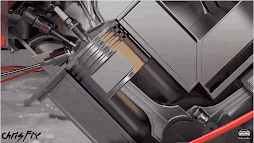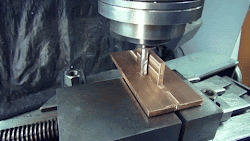
Detonation is the spontaneous combustion of the end-gas (remaining fuel/air mixture) in the chamber. It always occurs after normal combustion is initiated by the spark plug. The initial combustion at the spark plug is followed by a normal combustion burn. For some reason, likely heat and pressure, the end gas in the chamber spontaneously combusts. The key point here is that detonation occurs after you have initiated the normal combustion with the spark plug.Under normal conditions, the combusting air and fuel mixture inside the combustion chamber ignites in a controlled manner. The mixture is ignited by the spark, normally in the centre of the cylinder, and a flame front moves from the spark towards the outside of the cylinder in a controlled burn. Detonation, or engine knock, occurs simply when fuel pre-ignites before the piston reaches scheduled spark ignition. This means that a powerful explosion is trying to expand a cylinder chamber that is shrinking in size, attempting to reverse the direction of the piston and the engine. Causing sudden pressure changes in the cylinder (Up to 10x that normally experienced), and extreme temperature spikes that can be very damaging on engine pistons, rings, rods, gaskets, bearings, and even the cylinder heads.
Even the best engine components cannot withstand severe detonation for more than a few seconds at a time. More severe detonation obviously leads to more severe forms of engine damage. If there is enough heat and pressure in the combustion chamber, detonation can begin to occur before the spark plug even fires, which would normally initiate the combustion. Under these circumstances, known as "pre-ignition", the piston may be travelling up towards a wave of compressed, exploding gas. These are the worst kinds of detonation conditions, and can bend con-rods and destroy pistons.
Detonation causes three types of failure:
1. Mechanical damage (broken ring lands)
2. Abrasion (pitting of the piston crown)
3. Overheating (scuffed piston skirts due to excess heat input or high coolant
temperatures)
So what causes detonation?
Any of the following items can be factors that cause detonation:
Ignition Timing
Improper ignition timing is usually down to incorrect setup, rather than any system failure. This can be corrected by checking the static timing and maximum advance. Most modern forced induction vehicles have an electronic device known as a "knock sensor" that will control the ignition timing by retarding it if it detects any "knock".
Lean Air/Fuel ratio
A lean air/fuel mixture will promote detonation, because a lesser quantity of fuel, when vaporised, will absorb less heat. Thus a lean mixture increases heat, the root cause of detonation. For this reason, you will usually find that supercharged vehicles will, if anything tend to run a slightly rich Air/fuel mixture. In this way the extra fuel actually acts as a liquid intercooler.
Fuel Octane
A fuels Octane rating is a measure of its resistance to spontaneous combustion, or detonation. The greater the Octane the greater the resistance. In the UK, standard Unleaded fuel is rated at 95 Ron (Research Octane Number), Currently the highest Octane Rated Fuel available in the UK is Shell Optimax, this has an Octane rating of 98. (I am only using Optimax in the Lightweight.)
Exhaust gas back pressure
Any restriction or blockage in the Exhaust system will increase back pressure, this means that the hot exhaust gasses are kept in the combustion chamber for longer, thus increasing chamber temperature and increasing the likelihood of detonation.
Intercooler
If a supercharged system has been designed to operate with an intercooler, then anything that compromises the intercoolers efficiency will drastically lower the engines threshold to detonation.
Ambient heat
Very high boost, high performance supercharged systems tend to run close to the detonation threshold. These tend to be more susceptible to Ambient heat. On very hot days when the ambient temperature rises dramatically they can actually cross the threshold and the results can be disastrous.
So how do you get rid of detonation?
The two most common tricks (and easiest options) used by supercharger manufacturers and engine tuners looking to obtain maximum performance without detonation is 1. use higher octane fuel, and 2. retard the ignition timing.
Higher octane fuel burns more controllably and is not as likely to combust before the flame front. This is why racing engines use 100+ octane fuel. The ONLY benefit of racing fuel is that it moves you away from the detonation threshold, which allows you to be more aggressive with power producing factors - i.e. raise compression, advance timing, etc. So simply putting 100 octane fuel in a standard production car will not produce a racing car as it is just not tuned correctly to take advantage of the Octane rating.
Retarding the ignition timing will delay the timing of the spark, which also moves you away from your detonation threshold. Most popular "power programmers" or "chips" increase engine power by advancing the ignition timing, and requiring you to run a higher octane fuel to avoid detonation. These work great, except the advanced ignition timing is NOT compatible with most superchargers, unless you're happy to run 100 octane fuel. In fact, many supercharger systems include an "ignition boost retard" that retards the ignition timing when it senses boost from the supercharger.
Another way to avoid detonation is to cool the incoming air charge to lower the temperature inside the combustion chamber. On a supercharged application, this task can be handled by an intercooler/Charge cooler or by a water injection system (less common). The intercooler takes the incoming air charge and passes it over a series of air-cooled or water-cooled fins and ducts, thus cooling the air in the same way that a radiator cools your engine's coolant. Intercoolers are thus very popular in higher output supercharger systems, where detonation becomes more of a problem. A suitable intercooler allows you to run more boost and also allows you to eliminate the ignition boost retard, meaning you'll notice increased performance, and still experience no detonation.
Another way to lower the temperature of the combusting air and fuel is to run cooler heat range spark plugs. Many supercharger manufacturers will recommend cooler plugs for your supercharged engine.
Because a lean condition (fuel starvation) also contributes to detonation, it is important to make sure that the fuel system (pump, injectors, etc.) is capable of delivering the increased fuel requirements of the supercharged engine. Often, an otherwise perfectly tuned engine will experience detonation just because the fuelling system can't deliver enough fuel to the engine. Upgrading certain fuel components is sometimes necessary when supercharging an engine. More commonly the ECU that controls the Fuelling MAP needs to be upgraded. If you are installing a supercharger on an engine with other modifications, you need to make sure you consider the additional fuel requirements and compensate with larger injectors and / or a bigger fuel pump if required.
Conclusion
You should pay close attention to "knock" and pinging noises that come from your engine because they could indicate detonation inside the combustion chamber and should be dealt with immediately. If ignored it could prove to be a costly decision.
Although detonation can be potentially damaging to an engine, it is easily controlled once you understand the causes. With a little thought when implementing the chosen design there should be no reason for detonation to occur.






























